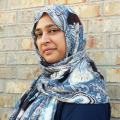To most people, summer means barbecues, vacations, and pool parties. With two elementary school children of my own, summer means all that and more to me, too — but it also signifies the start of something very special: Ramadan.
For Muslims, these 30 days mark the holy month of Ramadan, a time when we fast from dawn to dusk. In my interfaith work, I see a lot of overlap between the Muslim Ramadan and the Christian Lent, although there are significant differences. Many of my Christian friends ask me about how and why Muslims fast, and how they can support me in this important spiritual experience.
The basics of Ramadan are easy to grasp, especially if one comes from a Christian or Jewish background. Still, many of my non-Muslims friends may have questions. So here are some things Ramadan is — and isn’t:
1. Ramadan is an annual event.
In that way, it’s like Lent. Every year during Ramadan, Muslims wake up each morning before dawn, eat breakfast, and then fast until the evening prayer around sunset (this breaking of the fast is called iftar). The Islamic calendar is a lunar one, and is therefore slightly shorter than our everyday (Gregorian) calendar. Ramadan, and all other Islamic holidays, move ahead 10 days ahead each year. Over an average lifetime, a Muslim will experience Ramadan in every season and temperature.
2. Ramadan is a complete fast.
In that way, it’s unlike Lent. During this month, Muslims cannot eat or drink anything, be it a drop of water or a pill. It is also a fast from sexual activity and, more importantly, from negative behaviors such as gossip, offensive language, and argument.
3. Muslims increase their charity during Ramadan.
A key component of fasting is piety and goodness. Muslims believe that God rewards good behaviors much more during Ramadan than in other months, so we tend to also give increased amounts of charity to those less fortunate. In fact, the punishment for breaking a fast, or being unable for some reason to fast completely, is feeding a hungry person.
4. Not every Muslim fasts during Ramadan.
Only those who are healthy adults, not traveling, and in no health condition that fasting could exacerbate are allowed to fast. One doesn’t fast during pregnancy or nursing, for instance. While there is no set age for fasting to begin, most Muslims don’t allow their children to fast. Since Ramadan has been occurring in the summer for some time now, many Muslim parents train their children by letting them fast for half a day or only one day a week. Such a regimen allows them to learn about fasting, lets their bodies train for this marathon of spirituality — and still stay healthy.
After the logistical questions are done, many still ask the most important questions: Why fast? What does one get out of rejecting everything human beings take for granted during the daytime?
Muslims fast as a way to gain God’s pleasure. When addressing a Christian friend, the concept of fasting is easier to explain because they have a similar frame of reference in Lent: We fast in order to show that we are willing to sacrifice even good, lawful things like food and drink in order to gain God’s nearness.
We believe that fasting is good for the body and good for the soul. The physical discomfort of fasting mellows us in every way — physically, mentally, and spiritually. The hunger and thirst reminds us that we are at the mercy of God’s will, and helps us understand the plight of those who live in extreme poverty.
I like to call Ramadan a personal spiritual boot camp. One not only fasts but also prays more, is more careful of one’s interactions with others, tries to exhibit more patience and love. The hunger and thirst — even the overall sense of exhaustion one feels by the end of each day — is a fuel that pushes a Muslim to do better, to fight the internal impulses towards negativity and sin, and to become a better person. Is that possible without fasting? Maybe. But with fasting it is definitely probable. By the end of the 30 days of Ramadan, one feels invigorated, nearer to God, and somehow optimistic.
Ramadan is not a lonely exercise, or at least it shouldn’t be. It is a time of community and collective worship. Muslims tend to visit the mosque more, pray in congregation, even eat iftar together with family and friends. I remember as a child my grandmother would gather us children together for iftar around the dining table, urging us to eat whatever was on the table with the adults, even though we weren’t fasting ourselves.
So I advise my Christian friends: Please make contact with a Muslim community this Ramadan. Many larger mosques have open houses during iftar, or you can call and ask for a tour ahead of time. If you have Muslim friends or colleagues, ask them questions, and find out what Ramadan means to them personally. They may not join you for a lunch date, but they will be happy to answer your questions.
And once Ramadan is over, we celebrate! The end of Ramadan marks Eid-ul-Fitr, the biggest Muslim religious celebration. We wear new clothes, pray at the mosque, give each other gifts, share stories about our fasting experience, and generally have a good time to celebrate the (hopefully) successful end of another Ramadan.
Happy Ramadan, and Happy Eid in July!
Got something to say about what you're reading? We value your feedback!

